The Next Page
Are you curious about the power of international cooperation? And how it affects our future? Tune in to the #NextPagePod, the podcast of the UN Library & Archives Geneva, designed to advance the conversation on multilateralism.
Are you curious about the power of international cooperation? And how it affects our future? Tune in to the #NextPagePod, the podcast of the UN Library & Archives Geneva, designed to advance the conversation on multilateralism.
Episodes
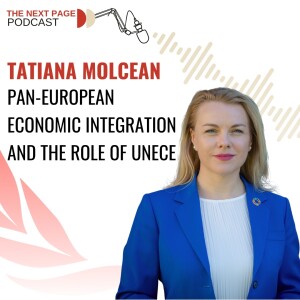
Friday Feb 23, 2024
Pan-European economic integration and the role of UNECE
Friday Feb 23, 2024
Friday Feb 23, 2024
A conversation with Under-Secretary-General Tatiana Molcean, Executive Secretary of UNECE
The United Nations Economic Commission for Europe (UNECE) is one of the five Regional Commissions of the United Nations. ECE was set up in 1947 to promote pan-European economic integration. Francesco Pisano met with UNECE’s new Executive Secretary, Ms. Tatiana Molcean for a conversation on the role of the Commission and how it serves multilateralism. They also talk about the vision for European economic integration and the challenges currently facing the wider European region.
Resources
UNECE website:https://unece.org/
Where to listen to this episode
Apple podcasts: https://podcasts.apple.com/us/podcast/the-next-page/id1469021154
Spotify: https://open.spotify.com/show/10fp8ROoVdve0el88KyFLy
YouTube: https://www.youtube.com/watch?v=R06Hz-T2C0M&t=3s
Content
Guest: Tatiana Molcean, United Nations Under-Secretary-General and Executive Secretary of UNECE
Host: Francesco Pisano
Producer: Amy Smith
Editing and social media designs: Mengna Chen
Recorded & produced at the United Nations Library & Archives Geneva
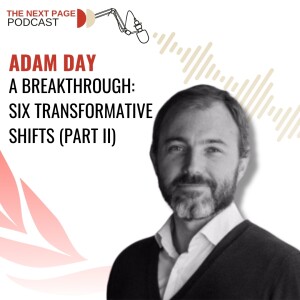
Friday Feb 09, 2024
A Breakthrough: six transformative shifts (Part II) with Adam Day
Friday Feb 09, 2024
Friday Feb 09, 2024
Will we have a breakthrough or a breakdown? In this second episode with Adam Day, Head of the Geneva Office of the United Nations University Centre for Policy Research, we continue the exploration of the Six Transformative Shifts proposed by the High-Level Advisory Board on Effective Multilateralism for a more secure and sustainable future.
Adam Day talks with Francesco Pisano, Director of the Library & Archives about the second three shifts: digital and data governance, peace and prevention and anticipatory action. They also discuss how the UN architecture that was set up post-World War II has aged and what a review of the UN Charter would look like.
Resources
HLAB Report:https://highleveladvisoryboard.org/breakthrough/
Our Common Agenda policy briefs: https://www.un.org/en/common-agenda/policy-briefs
United Nations University Centre for Policy Research: https://unu.edu/cpr/abouthttps://unu.edu/explore
Slaughter, A.-M. (2017). The Chessboard and the Web: Strategies of Connection in a Networked World. Yale University Press.
Previous episodes with Adam Day:
A Breakthrough. Part I: https://unitednationslibrarygeneva.podbean.com/e/a-breakthrough-six-transformative-shifts-part-i/
A time for change and effective multilateralism – a conversation with Adam Day | The Next Page (podbean.com)
Where to listen to this episode
Apple podcasts: https://podcasts.apple.com/us/podcast/the-next-page/id1469021154
Spotify: https://open.spotify.com/show/10fp8ROoVdve0el88KyFLy
YouTube: https://www.youtube.com/watch?v=R06Hz-T2C0M&t=3s
Content
Guest: Adam Day
Host: Francesco Pisano
Producer: Amy Smith
Editing and social media designs: Menga Chen
Recorded & produced at the United Nations Library & Archives Geneva
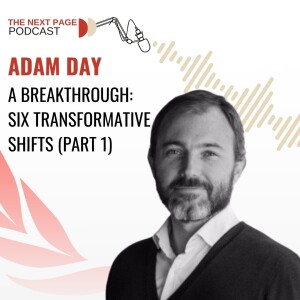
Friday Jan 26, 2024
A Breakthrough: Six Transformative Shifts (Part I)
Friday Jan 26, 2024
Friday Jan 26, 2024
In this and the following episode, we take a deep dive with Adam Day, Head of the Geneva Office of the United Nations University Centre for Policy Research, into the Six Transformative Shifts proposed by the High-Level Advisory Board (HLAB) on Effective Multilateralism for a more secure and sustainable future.
Here, in part 1, Adam Day talks with Francesco Pisano, Director of the Library & Archives, about the first three shifts: rebuilding trust in multilateralism; planet and people; and global finance. They talk about re-thinking what consensus means, making multilateralism inclusive and the rights of future generations. Adam also focuses on the vital need to elevate environmental issues, he discusses peace as a public good, and looks at the viable yet ambitious track on finance.
Resources
Previous episode with Adam Day: A time for change and effective multilateralism – a conversation with Adam Day | The Next Page (podbean.com)
HLAB Report:https://highleveladvisoryboard.org/breakthrough/
Our Common Agenda policy briefs: https://www.un.org/en/common-agenda/policy-briefs
United Nations University: https://unu.edu/explore
Where to listen to this episode
Apple podcasts: https://podcasts.apple.com/us/podcast/the-next-page/id1469021154
Spotify: https://open.spotify.com/show/10fp8ROoVdve0el88KyFLy
YouTube: https://www.youtube.com/watch?v=R06Hz-T2C0M
Content
Guest: Adam Day, Head of the Geneva Office, United Nations University Centre for Policy Research
Host: Francesco Pisano
Producer: Amy Smith
Editing and social media designs: Menga Chen
Recorded & produced at the United Nations Library & Archives Geneva
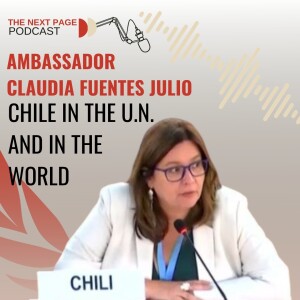
Friday Jan 12, 2024
Chile in the U.N. and in the world
Friday Jan 12, 2024
Friday Jan 12, 2024
We are starting our 2024 series with an episode with H.E. Mrs. Claudia Fuentes Julio, Permanent Representative of Chile.
Ambassador Fuentes Julio talks about her interesting career path into diplomacy and representing her country. She tells us about the geography of Chile, bounded between the magnificent Andes and the vast Pacific Ocean, and she relates some of the history of Chile and its long connection with multilateralism, including as a founding Member of the United Nations.
Where to listen to this episode
Apple podcasts: https://podcasts.apple.com/us/podcast/the-next-page/id1469021154
Spotify: https://open.spotify.com/show/10fp8ROoVdve0el88KyFLy
YouTube: https://www.youtube.com/watch?v=KdlO3HCabTk
Content
Speakers: Ambassador Claudia Fuentes Julio
Host: Francesco Pisano
Producer: Amy Smith
Editing and social media designs: Menga Chen
Recorded & produced at the United Nations Library & Archives Geneva
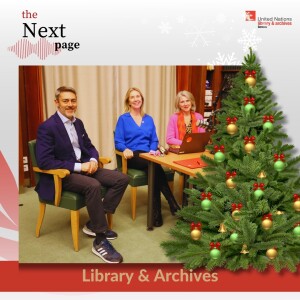
Wednesday Dec 20, 2023
Knowledge matters in incomprehensible times
Wednesday Dec 20, 2023
Wednesday Dec 20, 2023
In this end of year episode, Francesco Pisano, Director of the Library & Archives and senior managers Sigrun Habermann and Blandine Blukacz-Louisfert, find themselves on the other side of the table to talk about why knowledge matters in our times, whether libraries matter, what expertise we need and what digitization, technology and AI can mean for knowledge services.
Together, they come up with an innovative list of wishes to bring you advanced knowledge services for work and research in multilateralism.
Resources:
https://www.ungeneva.org/en/library-archives
Where to listen to this episode
Apple podcasts: https://podcasts.apple.com/us/podcast/the-next-page/id1469021154
Spotify: https://open.spotify.com/show/10fp8ROoVdve0el88KyFLy
YouTube:
Content
Speakers: Francesco Pisano, Sigrun Habermann, Blandine Blukacz-Louisfert
Host: Amy Smith
Producer: Amy Smith
Editing & social media: Mengna Chen, Amy Smith
Recorded & produced at the United Nations Library & Archives Geneva
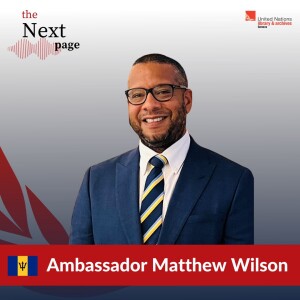
Friday Dec 08, 2023
Barbados in the UN and in the world
Friday Dec 08, 2023
Friday Dec 08, 2023
A conversation with Ambassador Matthew Wilson
As part of our ambassadors’ series, for this episode we invited the Permanent Representative of Barbados, Ambassador Matthew Wilson, to explore the role of Barbados in the Caribbean region and in the world today, and its enduring partnership with the UN over 40 years.
Ambassador Wilson talks with Francesco Pisano, Director of the Library & Archives, providing us with a comprehensive insight into Barbados' fascinating history, its position as the hub for the UN Multi-Country Office (MCO) for Barbados and the Eastern Caribbean and as a Permanent Representative of the key global challenges facing multilateralism, and its profound engagement with the UN as a small country.
Where to listen to this episode
Apple podcasts: https://podcasts.apple.com/us/podcast/the-next-page/id1469021154
Spotify: https://open.spotify.com/show/10fp8ROoVdve0el88KyFLy
YouTube: (2) Barbados in the UN and in the world - YouTube
Content
Speaker: H.E. Ambassador Matthew Wilson
Host: Francesco Pisano, Director, UN Library & Archives
Producer: Amy Smith
Editing & social media: Mengna Chen, Amy Smith
Recorded & produced at the United Nations Library & Archives Geneva
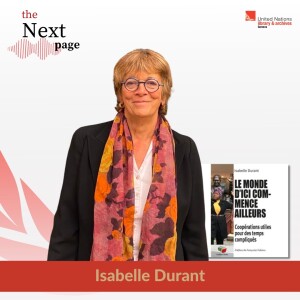
Friday Nov 17, 2023
Le monde d’ici commence ailleurs : bookcast avec Isabelle Durant
Friday Nov 17, 2023
Friday Nov 17, 2023
Le Monde d’ici commence ailleurs : coopérations utiles pour des temps compliqués
Pour cet épisode, nous sommes ravis d’accueillir Isabelle Durant, ancienne Secrétaire générale adjointe de la Conférence des Nations Unies sur le Commerce et le Développement (CNUCED). Isabelle Durant est une femme politique belge, membre du parti Ecolo qu'elle dirigea à deux reprises, elle fut sénatrice et Vice-Première ministre fédérale en Belgique. Elle a été vice-présidente du Parlement européen pendant la 7e législature et elle a ensuite été élue au Parlement de la Région de Bruxelles-Capitale.
Son livre, Le Monde d’ici commence ailleurs : coopérations utiles pour des temps compliqués vient de paraître aux Editions Couleur livres. Isabelle Durant parle avec Francesco Pisano, Directeur de la Bibliothèque & Archives de l’ONU Genève de son parcours, de son livre et elle se penche sur deux thématiques très actuels : les « obsessions identitaires et migrations » et la question du « multilatéral à l’agonie ? »
Ressources
Livre : Durant, I. (2023) Le Monde d’ici commence ailleurs : coopérations utiles pour des temps compliqué. Éditions Couleur livres
Où écouter cet épisode
Apple podcasts: https://podcasts.apple.com/us/podcast/the-next-page/id1469021154
Spotify: https://open.spotify.com/show/10fp8ROoVdve0el88KyFLy
YouTube:
Contenu
Invitée : Isabelle Durant
Hôte : Francesco Pisano
Réalisation et montage : Amy Smith
Conception pour réseaux sociaux : Amy Smith & Mengna Chen
Recorded & produced at the United Nations Library & Archives Geneva
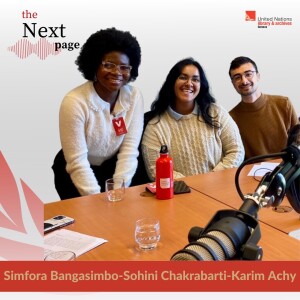
Friday Nov 10, 2023
Futures of multilateralism
Friday Nov 10, 2023
Friday Nov 10, 2023
Futures of multilateralism – an applied research project on the challenge of transforming the global order
In this episode, three young researchers from the Graduate Institute in Geneva, Simfora Bangasimbo, Karim Achy, Sohini Chakrabarti talk about their applied research project on Futures of Multilateralism. The UN Office at Geneva and the Graduate Institute collaborate in several knowledge and research domains and this research project on futures of multilateralism was submitted by the Library & Archives and The Fab, the Institute’s innovation lab.
Francesco Pisano, Director of the Library & Archives, discusses with the graduate students as they explore what multilateralism may look like in the following 3 scenarios: a world of stable and cooperative geopolitics and open access technology; a world of volatile geopolitics and open access technology; and a world of volatile geopolitics and closed access technology. In the second part, the students move on to a stimulating discussion reflecting on their research.
Resources:
IHEID - The Fab: https://www.graduateinstitute.ch/FAB
Our Common Agenda: https://www.un.org/en/common-agenda
Where to listen to this episode
Apple podcasts: https://podcasts.apple.com/us/podcast/the-next-page/id1469021154
Spotify: https://open.spotify.com/show/10fp8ROoVdve0el88KyFLy
YouTube:
Content
Speakers: Simfora Bangasimbo, Karim Achy, Sohini Chakrabarti
Host: Francesco Pisano, UN Library & Archives
Producer: Amy Smith
Editing & social media: Mengna Chen, Amy Smith
Recorded & produced at the United Nations Library & Archives Geneva
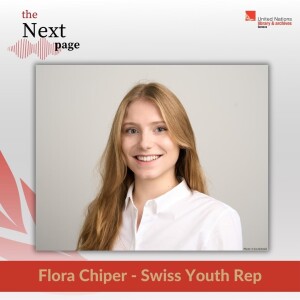
Friday Oct 27, 2023
A UN for the future
Friday Oct 27, 2023
Friday Oct 27, 2023
A conversation with Swiss Youth Representative, Flora Chiper
This episode with Flora Chiper, Swiss UN Youth Representative for 2023-2025, explores the role of Youth Representatives and their current work, vision and hopes for multilateralism. Flora Chiper is multicultural and multilingual and brings a scientific perspective to the team of Swiss youth reps. She is currently a postgraduate student at the University of Basel, Department of Biomedicine Tissue Engineering Group and was previously at Harvard Medical School researching cartilage regeneration using stem cells. Flora advocates for a more data-driven decision making, long-term thinking and for more meaningful inclusion of youth in the multilateral system.
Resources:
UN Youth Delegate Programme: https://social.desa.un.org/issues/youth/un-youth-delegate-programme#:~:text=The%20roles%20of%20a%20youth,attending%20meetings%20and%20informal%20negotiations.
Conseil Suisse des Activités de Jeunesse : https://www.sajv.ch/en/projects/youth-rep
Youth: https://social.desa.un.org/issues/youth
Our Common Agenda: https://www.un.org/en/common-agenda
SDG Report. Towards a Rescue Plan for People & Planet: The-Sustainable-Development-Goals-Report-2023.pdf (un.org)
Where to listen to this episode
Apple podcasts: https://podcasts.apple.com/us/podcast/the-next-page/id1469021154
Spotify: https://open.spotify.com/show/10fp8ROoVdve0el88KyFLy
YouTube:
Content
Speaker: Flora Chiper, Swiss Youth Rep
Host: Amy Smith, UN Library & Archives
Producer: Amy Smith
Editing & social media: Mengna Chen, Amy Smith
Photo: © Jos Schmid
Recorded & produced at the United Nations Library & Archives Geneva
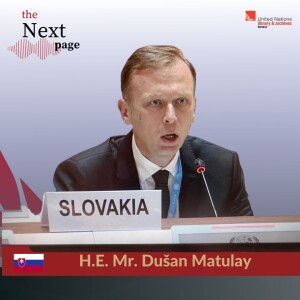
Friday Oct 13, 2023
Slovakia in the UN and in the world
Friday Oct 13, 2023
Friday Oct 13, 2023
A conversation with Ambassador Dušan Matulay
This episode is part of our ambassadors’ series hosting Permanent Representatives of UN Member States in Geneva for conversations about the role of their countries in the UN and in the world. We invited the Permanent Representative of Slovakia, H.E. Mr. Dušan Matulay, on the occasion of the 30th anniversary of Slovakia’s membership in the UN.
Ambassador Matulay talks with Francesco Pisano, Director of the Library & Archives and tells us more about Slovakia’s long history, its position as a landlocked country at the very heart of Europe, what Slovakia stands for and wants to share with the world, and what it means to be a smaller country at the United Nations.
Where to listen to this episode
Apple podcasts: https://podcasts.apple.com/us/podcast/the-next-page/id1469021154
Spotify: https://open.spotify.com/show/10fp8ROoVdve0el88KyFLy
YouTube: https://www.youtube.com/watch?v=i1B5wwFLa5k
Content
Speaker: H.E. Ambassador Dušan Matulay
Host: Francesco Pisano, Director, UN Library & Archives
Producer: Amy Smith
Editing & social media: Amy Smith, Nadia Al Droubi, Mengna Chen
Recorded & produced at the United Nations Library & Archives Geneva

The #NextPagePod
Are you curious about the power of international cooperation? And how it affects our future? Then tune in to the #NextPagePod, the podcast designed to advance the conversation on multilateralism!
Each episode delves into global issues through a multilateral lens, exploring how collaboration across disciplines can facilitate reaching common goals.
Produced at the United Nations Library & Archives Geneva
Editorial Team:
Editor & Coordinator - Amy Smith
Hosts: Francesco Pisano, Natalie Alexander, Amy Smith, Blandine Blukacz-Louisfert, Hermine Diebolt.
Podcast logo and designs - Natalie Alexander, Amy Smith.





